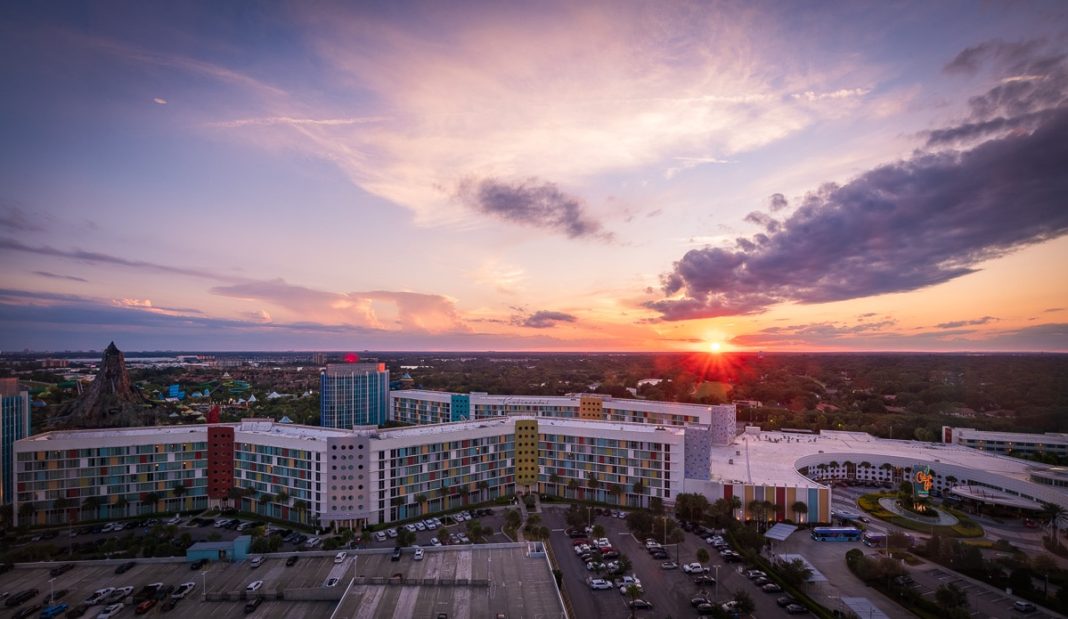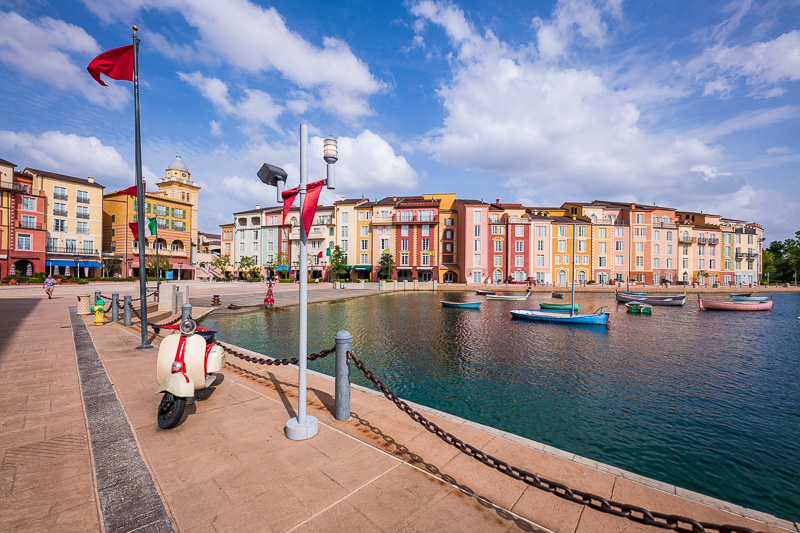
Planning on visiting both Universal Orlando and Walt Disney World during your Florida vacation? This weighs the pros & cons, with an unbiased look at Universal vs. Disney resorts based on price, perks, amenities, location, transportation, dining, and more.
For many Walt Disney World fans who were once “bubble or bust!” might now find themselves reevaluating that position, as a lot has changed. The losses of on-site perks, ranging from the FastPass+ booking window to scaled-back Extra Magic Hours have resulted in many WDW diehards venturing off-site.
Without question, the biggest thing has been the demise of Disney’s Magical Express. By eliminating that airport transportation that was included in the cost of Disney-owned resort stays, the company has voluntarily (and perplexingly) punctured the Disney bubble. Forced to deal with transportation regardless, many visitors are now questioning whether they should simply stay off-site and visit Walt Disney World while staying at more cost-effective accommodations…
This is not merely idle speculation. We know this is happening because hundreds of readers have told us this is what they have started doing. For many of these people, planning Florida vacations that include visits to multiple theme parks, Universal Orlando’s hotels present a very attractive alternative.
Personally, I do wonder how this will ‘evolve’ in the next few years. Walt Disney World’s on-site advantage has started to return, thanks to the Disney Dining Plan coming back, free parking being reinstated, other little perks, and longtime fans adjusting to Lightning Lanes and the new extra hours system. It’s still not what it was circa-2019, and probably never will be, but it’s better than a couple years ago.
The bigger changes, however, will come on the Universal side of the ledger. The opening of Epic Universe is going to be huge, with many fans not appreciating the extent to which it’s going to change everything from prices to perks. Demand for Universal hotels is going to skyrocket, and although the new 3rd theme park is an unequivocal positive, it’ll have second-order effects that will be far less positively received as it reshapes the market for theme park hotels in Central Florida.
Even we cannot anticipate the far-reaching consequences of Epic Universe and how it’ll be a game-changer. For now, let’s cover the current pros and cons of staying on-site at Universal Orlando versus at Walt Disney World. We’ve stayed at every single Universal and Disney-owned hotel, plus numerous off-site and third party hotels throughout Central Florida. Here’s our take on the advantages and disadvantages offered by Disney and Universal hotels…
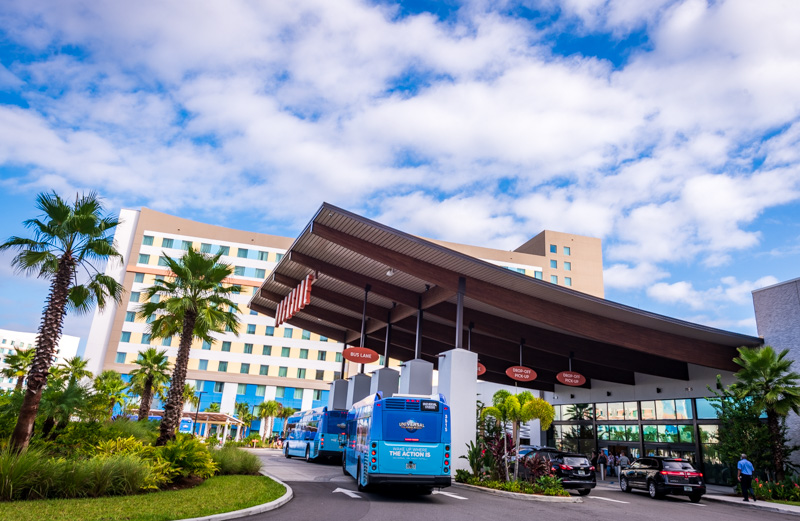

Airport Transportation – With the demise of Disney’s Magical Express, neither Walt Disney World nor Universal Orlando have exclusive airport transportation included as a guest perk.
See our Airport Transportation to Walt Disney World Guide for a rundown of the choices, which are more or less the same for Universal Orlando.
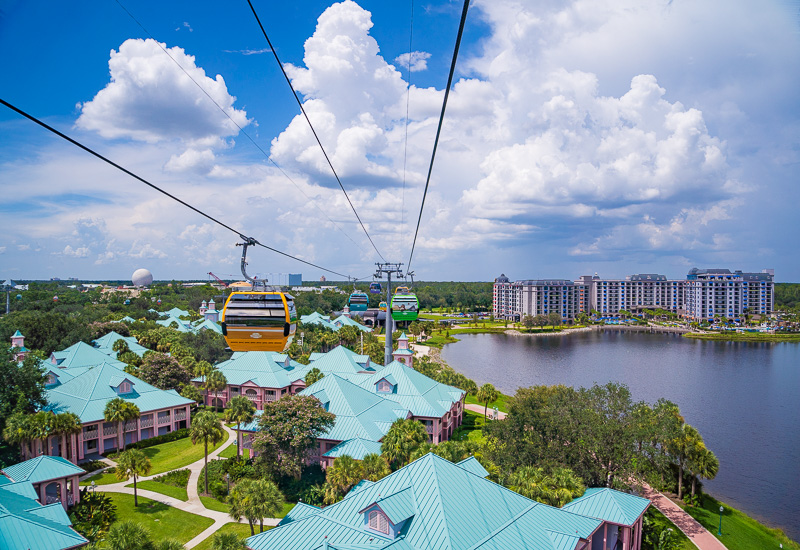

Internal Transportation – Once on property at either Walt Disney World or Universal Orlando, guests can use a provided transportation between hotels, theme parks, and other locations on property. All of this transportation is complimentary (or built into the price of their room). At both, transportation is a huge advantage that can tip the scales in favor of staying on-site, eliminating the need for a rental car.
If variety is a selling point, Walt Disney World has a greater range of options: bus, monorail, boat, Skyliner gondola, or even walking. The efficiency of the transportation provided to Walt Disney World resort hotel guests is hotly disputed, and is largely a result of the resort complex’s sprawling size.
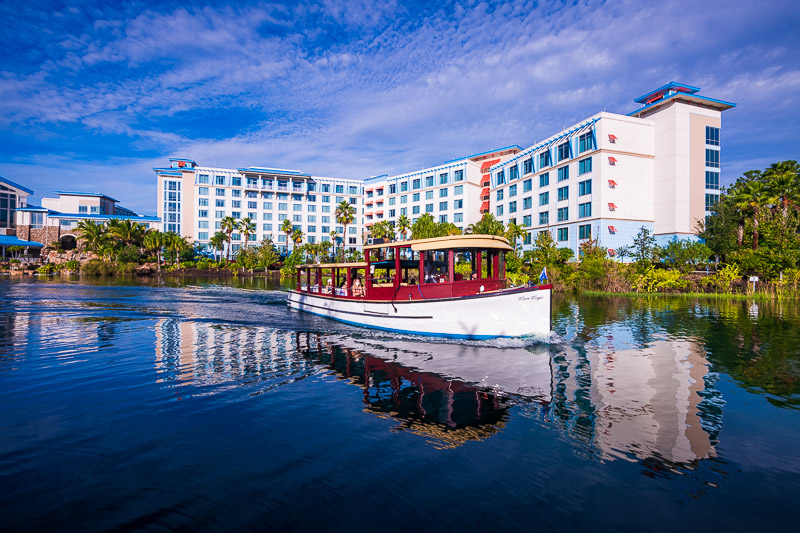

Universal Orlando has more limited options: bus, boat, or walking. However, it is unquestionably more efficient, with buses departing almost one right after the other and walking between the hotels and theme parks being possible at all properties except Endless Summer Resort. This is owing to Universal Orlando’s more compact layout, which makes nearly everything accessible by foot, and bus turnaround times faster due to the shorter commutes.
In our view, Universal Orlando is the easy winner here. We’ve never had headaches waiting for buses, or with exceeding long transit times eating up a significant chunk of our vacation. Transit at Universal is a breeze, benefiting from the condensed layout tremendously. Walt Disney World’s size is both a blessing and a burden–when it comes to transportation, it’s the latter. If you’re looking for on-site entertainment, dining, or a ‘bubble’ from the real world, it’s a blessing. Walt Disney World is also more conducive to longer stays by virtue of its larger scope and scale.
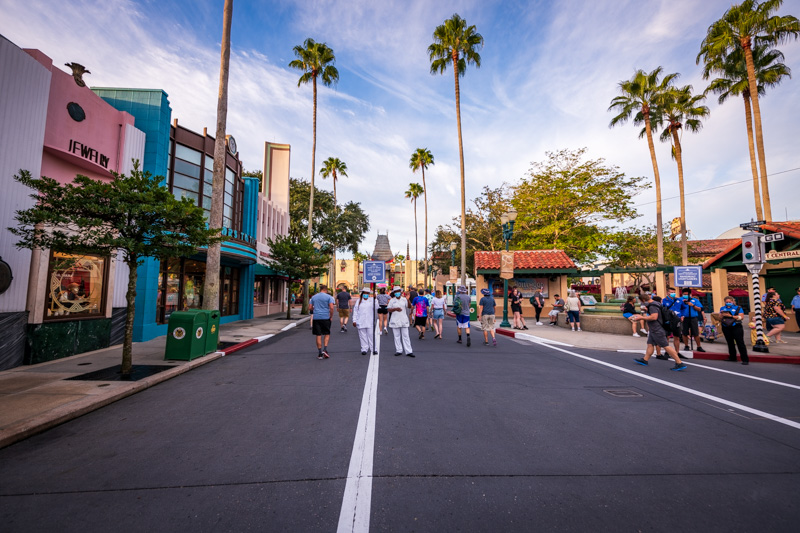

Extra Hours – Walt Disney World replaced Extra Magic Hours, with Early Entry and Extended Evening Hours. Whereas morning Extra Magic Hours lasted for an hour at a single park per day, Early Entry is 30-minute access to any Walt Disney World theme park. This is a nice head-start for on-site guests, and also impossible to avoid for off-site guests.
Extended Evening Hours has a smaller pool of eligibility and occurs less frequently than Early Entry. It’s exclusively for guests staying at Deluxe Resorts, Deluxe Villas (Disney Vacation Club units), or other select hotels (only the Swan & Dolphin and Shades of Green). Extended Evening Theme Park Hours occur two nights per week in total and lasts for 2 hours. It is hugely beneficial to eligible guests, and minimally burdensome to those who are not eligible since it can easily be planned around.
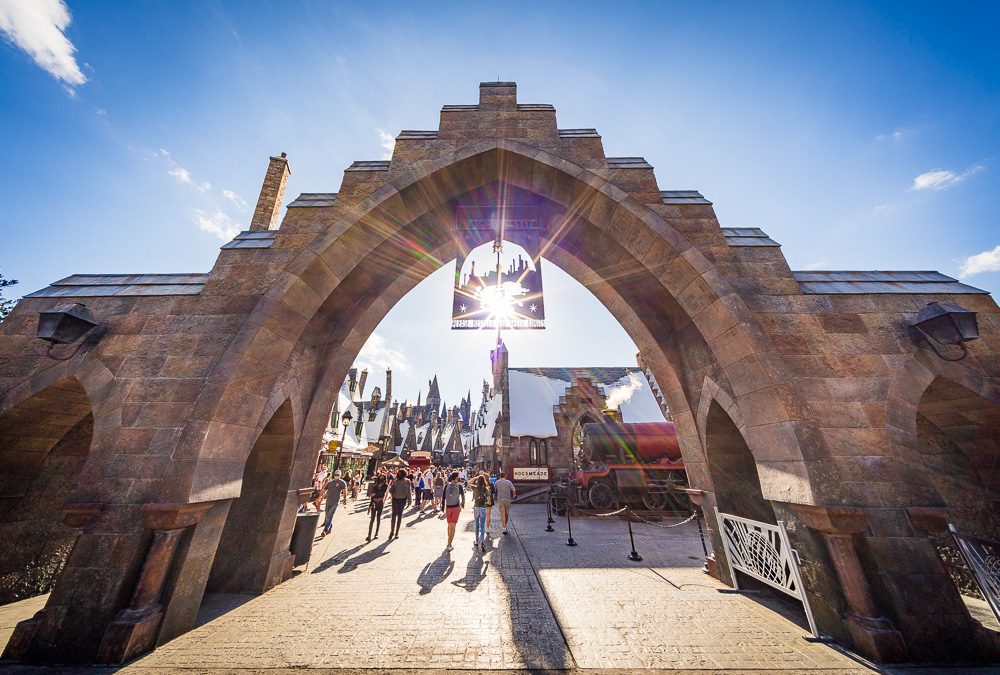

Universal Orlando offers Early Park Admission to select attractions at Islands of Adventure and Universal Studios Florida (namely, the Wizarding World of Harry Potter) one hour before the theme parks open to the general public. Volcano Bay also offers 30 minute Early Park Admission.
Despite their duration differences, the two early entry programs are pretty comparable to one another. If you’re one of the first in the pack headed towards Jurassic World VelociCoaster or Star Wars: Rise of the Resistance on a busy day, this can save a ton of time. In both cases, lines can build for eligible attractions pretty quickly.
If you’re looking at booking higher tier resort, Walt Disney World gets the win here as Extended Evening Hours are fantastic and have no counterpart at Universal Orlando. For everyone else, it’s more or less a wash.
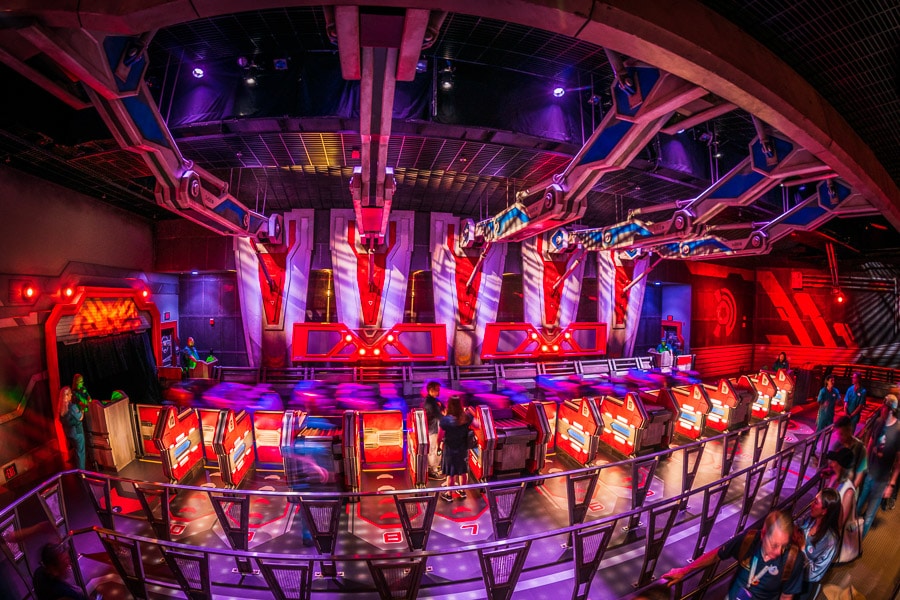

Line Skipping – With the elimination of free FastPass, there is no longer a significant on-site advantage when it comes to Genie+ and Lightning Lanes, outside of buying a la carte line-skipping access to Star Wars: Rise of the Resistance or Guardians of the Galaxy: Cosmic Rewind.
Guests wanting to take advantage of Genie+ and/or Individual Lightning Lanes at Walt Disney World can expect to spend $18 to around $50 per person, per day. The lower amount is if you visit during a less-busy time and only purchase the Genie+ service; the higher amount is Genie+ and an Individual Lightning Lane or two during peak season.
We would estimate that the average on-site guest will end up spending around $60 to $120 per person for line-skipping at Walt Disney World over the course of their trip, depending upon crowd levels. This assumes that they will not purchase Genie+ or Individual Lightning Lanes when they’re not necessary or useful, and will utilize savvy strategy to beat the crowds. (See our Guide to Genie+ at Walt Disney World & Lightning Lane FAQ for everything you need to know, including when to buy and not buy line-skipping access.)
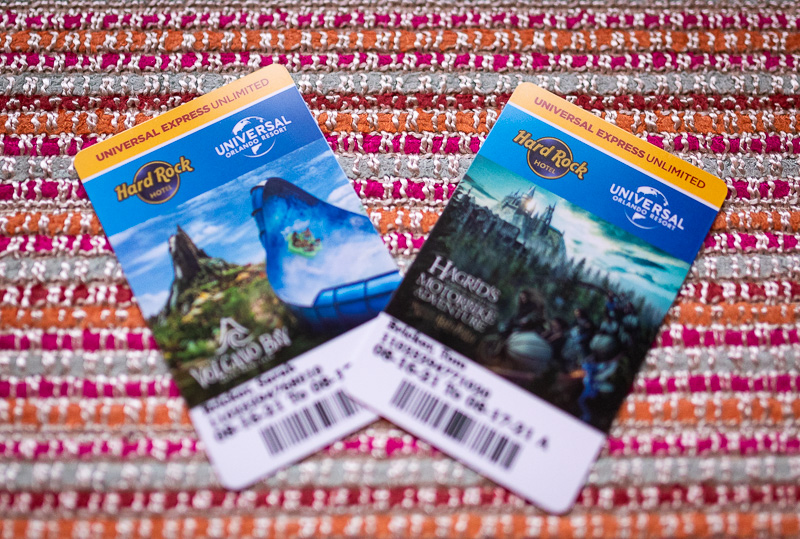

By contrast, guests staying at Universal Orlando’s Premier Hotels (Royal Pacific, Hard Rock Hotel, Portofino Bay) get free Unlimited Express Pass to skip the regular lines at most popular attractions in Universal Studios Florida and Islands of Adventure. This is Universal’s equivalent of FastPass/Lightning Lanes, but better. Unlimited Express Pass normally costs a lot more money and, as the name suggests, it’s unlimited. That’s right, guests of Universal’s top tier hotels get infinite line skipping!
Unlimited Express Pass has a value of over $100 per person each day, meaning its value could exceed the total cost of the hotel (or at least the cost of upgrading from a lower tier resort). If you’re a party of 4, there’s a good chance that’ll be true, as Universal’s Premier Hotels start at around $325 per night.
There’s a reason Express Pass normally costs more than Genie+ and Lightning Lanes: it’s better. Express Pass is frictionless, doesn’t require ride reservations, or any technology whatsoever. As noted above, it’s also unlimited. See our full comparison: Universal’s Express Pass v. Genie+ at Walt Disney World for a full rundown on the pros & cons of each.
While everything else here is significant, Unlimited Express Pass is the selling point for Universal Orlando’s Premier Hotels. If you’re family is full of ride junkies and you’ll do 2 days or more at Universal Orlando, this one perk–by itself–is enough to justify at least a split stay between Universal and Disney. It’s huge.
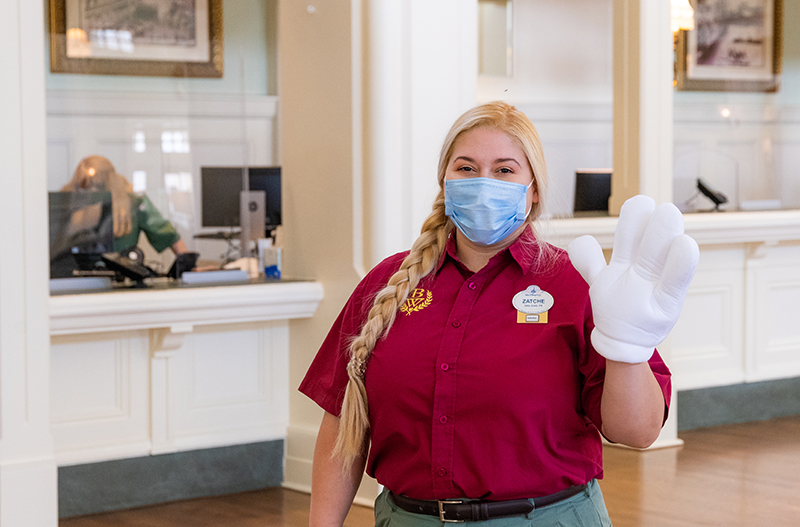

Service Quality – Diehard fans will tell you that Walt Disney World is more magical thanks to the Cast Members. It is fair to say that Disney draws more passionate employees, many of whom buy into Walt Disney’s legacy and the company’s core values. This is also aided by the College Program, which brings fresh faces to Florida who often espouse the above, and likely have more enthusiasm by virtue of less long-term exposure to guests.
However, the notion that there’s an across the board difference between Disney and Universal employees is false. This is not to denigrate or disparage Cast Members–to the contrary, many go above and beyond to make lasting memories for guests. It’s more a reflection of the reality that both are largely drawing from the exact same labor pool in Central Florida and both face the same staffing shortages.
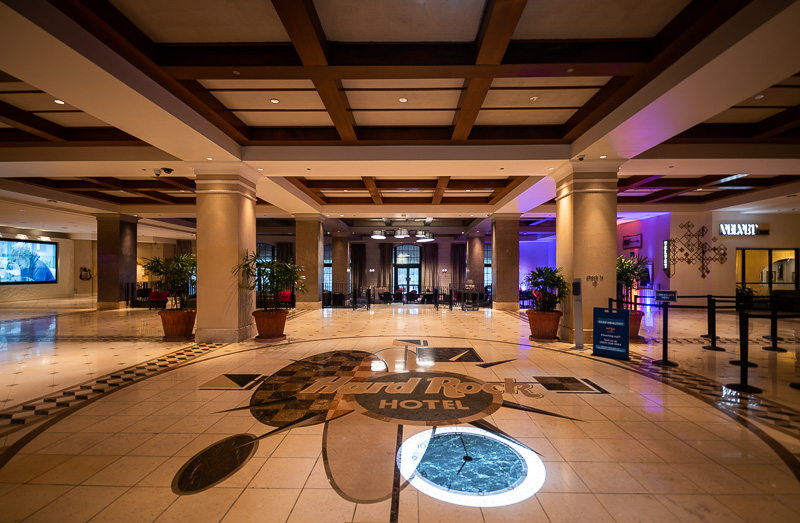

While Disney’s advantages are discussed above, Universal also has a couple of things going for it. First, it enjoys a reputation as a better employer in Central Florida. Not by a pronounced degree, but enough of one that frontline employees who have worked at both tend to marginally favor Universal. Moreover, the pressure felt by employees from Walt Disney World guests–who generally are higher-stress due to planning burdens and the more expensive vacation stakes–also can help tip the service scale in Universal’s favor.
We’d also add that Loews (which operates the resorts at Universal Orlando) is a better hospitality company when it comes to hotel operations. Disney’s expertise is in theme parks, and while there are individual WDW hotels that are incredibly well-managed, it’s clear that the core product is theme parks. Disney’s resort operations aren’t structured in a way that loyal guests of chained-brand hotels might expect, and many service features are unavailable or lacking. Neither are on par with an upscale Hyatt or Hilton–but Loews is closer.
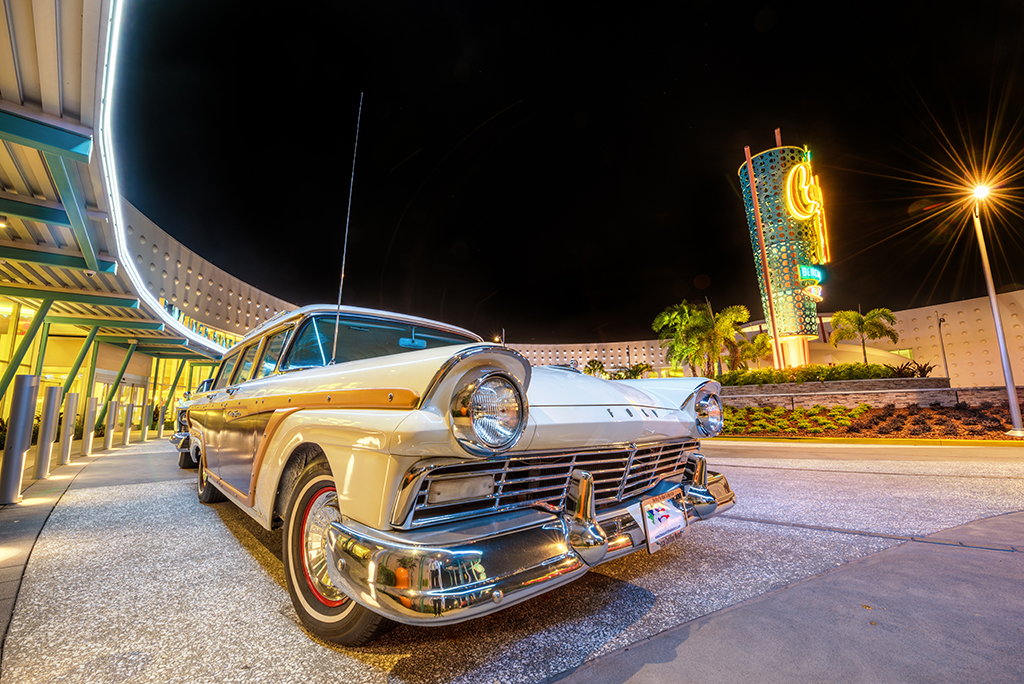

Parking Fees – Walt Disney World stopped charging for overnight hotel parking last year, reversing an extremely unpopular decision made several years earlier. For those who drive or have rental cars, that amounts to a savings of $15 to $25 per night, depending upon the resort tier.
Universal’s hotels had parking fees prior to Disney introducing the charges and still do currently after Disney has removed them–we expect nothing to change. Universal’s self-parking rates are $15 to $28, with Endless Summer being cheapest and the trio of Premier Hotels being most expensive. Cabana Bay is also at the lower end of the pricing spectrum, whereas Sapphire Falls prices are pretty close to the Premiers.


Resort Fees – Hidden fees have proliferated in recent years at off-site Orlando hotels that charge low base prices but have totals that can amount to double that. Some are known to charge non-optional resort fees for “wellness packages” (their term, not ours) including things like internet, newspaper, and bottled water. We cannot stand these resort fees and recommend you fight back against the incredibly consumer-unfriendly practice.
Neither Universal Orlando nor Walt Disney World properties charge resort fees. Given the increasing blowback against resort fees, we do not expect either to introduce them. If anything, other hotels will start eliminating resort fees. (Either by choice or by law.)
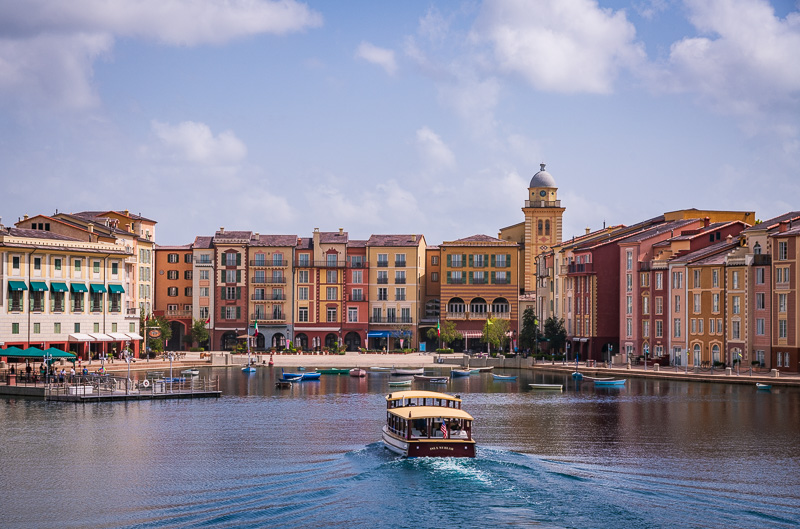

Theme & Design – Many guests love to stay in hotels that are an extension of the theme park experience. Walt Disney World resorts offer a range of distinct designs, from budget options that scream “Disney” with icons from animated films to upscale accommodations with sophisticated and immersive atmosphere. They have an additional layer of detail and storytelling to “transport” guests to a different time and place.
In terms of luxury, Disney hotels often do not surpass their real world counterparts, but they almost always have a better sense of place. It’s a very encapsulating experience, and one of the big selling points of on-site accommodations at Walt Disney World.
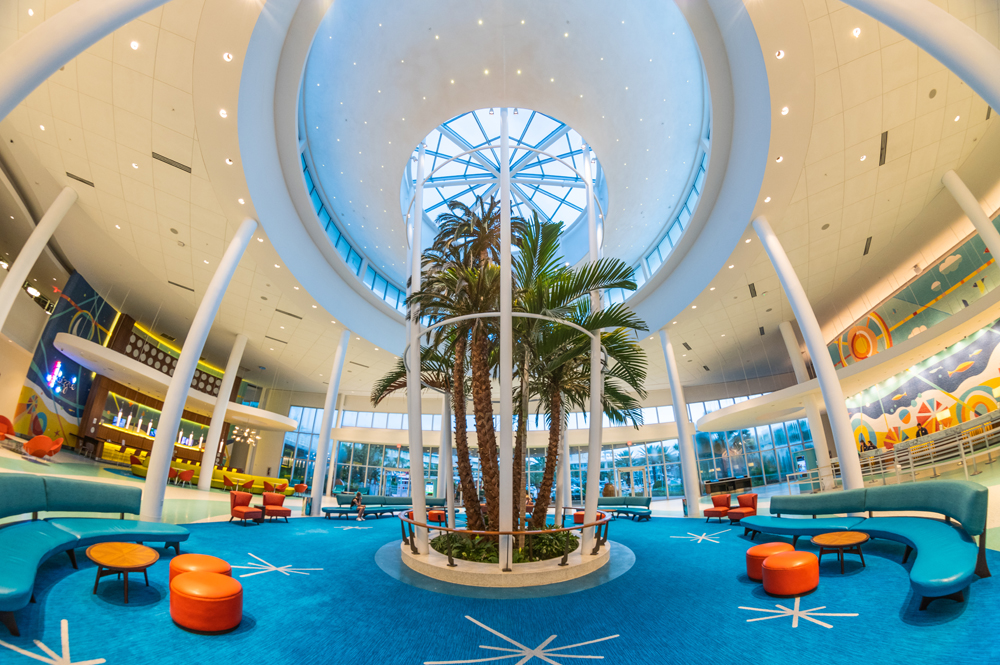

Universal Orlando is no slouch in this regard. A few of its resorts arguably are among the top 10 themed hotels in Central Florida, and several hold their own against Disney’s counterparts. In particular, Portofino Bay, Royal Pacific, and Cabana Bay all execute their respective themes at a very high level, offering a level of depth and detail on par with Disney.
The rest are not weak by any stretch, but tend to favor function over form. Their designs focus on a streamlined layout, comfort, and amenities–rather than a transportive theme.
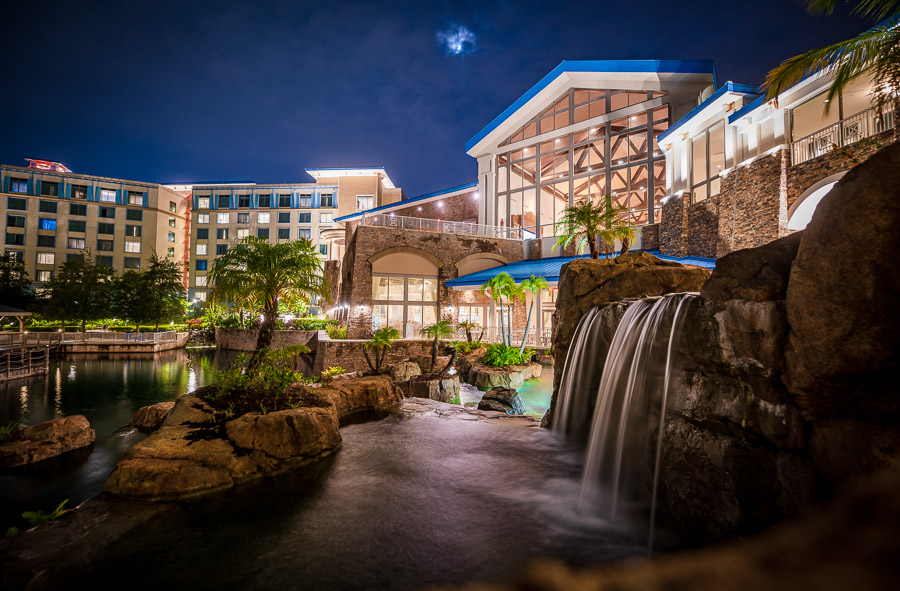

Comparing the Polynesian to Royal Pacific or Beach Club to Portofino Bay can make sense, as there are clear parallels and deliberate contrasts. The comparisons fall apart when looking at Sapphire Falls v. Port Orleans Riverside. Their design objectives were radically different, each with unique but incomparable pros and cons.
One thing that is notable here is that Universal’s hotels tend to be newer. Every single Universal hotel was built within the last 25 years–most within the last decade. Some of Walt Disney World’s resorts were built 50 years ago–most are well over a decade old. This is actually not relevant from the perspective of condition or wear & tear, but is in terms of style and sensibilities. Many of Disney’s hotels are sprawling, with rooms in outlying buildings separated from the main lobby. Most of Universal’s hotels are tower-style, all under one roof.
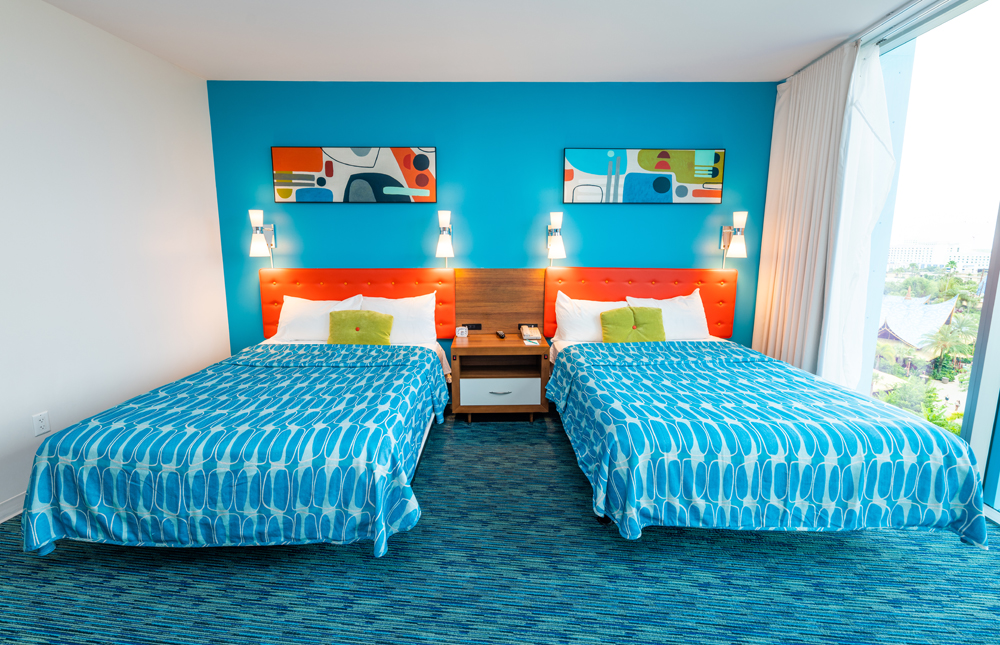

Rooms & Pools – This might seem like an odd pairing, but it’s only being done because these two very different, and very important categories are also the most hotel-specific. The only generalization we’ll make is that Universal tends to do the lower end hotel rooms better and Disney tends to do the higher end hotel rooms better (and larger).
Rooms and pools otherwise vary for each specific hotel–refer to specific reviews for insight that’s actually useful. This is already going to be a long post, and it’d be double the length for an exhaustive, across-the-board room and pool comparison.
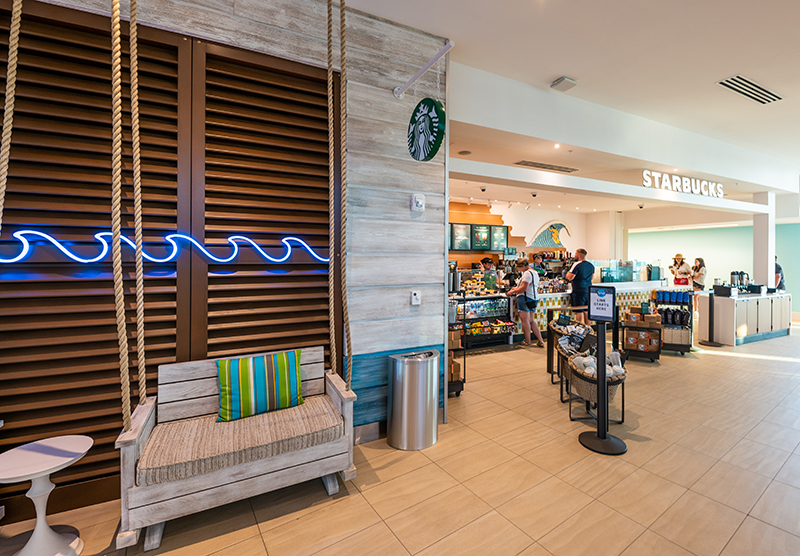

Dining – This is probably our biggest blind spot and source of bias. We’ve eaten at every single Walt Disney World resort restaurant, most several times. We’ve eaten at many–but far from all–Universal Orlando hotel dining options.
There are some aspects of dining at which Universal Orlando resorts excel. Across the board, the coffee situation is better. Food courts at the less expensive hotels are more ambitious and a better experience. Lobby bars are generally strong, and poolside dining is surprisingly robust at Universal hotels.


While Universal hotels tend to have a lot of restaurant options, I’d argue that they lack variety. Virtually every meal we’ve had at Universal hotels could be described as comfort food. There are a lot of choices, but most are regional variations of that–even fine dining is often just more expensive comfort food, not cuisine that’s actually ambitious or inventive.
At one time, this was understandable because Universal’s resort restaurants offered significantly better value for money. That’s still true to a degree, but the gap has closed. In the last two years, we’ve noticed menu prices jump at Universal Orlando, outpacing even Walt Disney World restaurants.
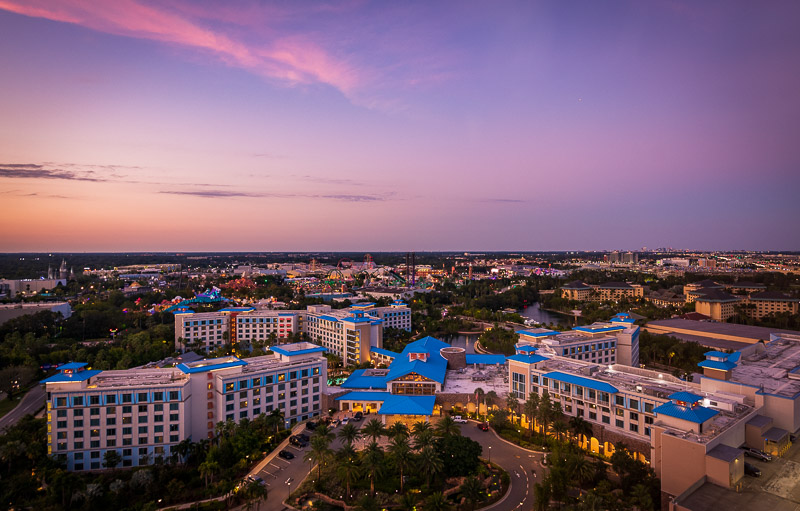

Pricing – Both are somewhat insulated from off-site competition. For visitors who want the on-site location, a seamless experience from their resort to the theme parks, rooms with specific themes, or certain theme park perks, there’s no real alternative. Universal and Disney are thus able to charge more than they could for the exact same hotels plopped down in Duluth, Minnesota.
Of course, that’s more than a bit disingenuous. If you relocated Four Seasons Bora Bora from its tropical over-the-water location to a corn field, or moved Hotel Shangri-La Paris so it didn’t overlook the Eiffel Tower, the same would be true. There’s a reason resorts with views of Cinderella Castle fetch otherwise-astronomical prices, and it’s a well-established rule of real estate (“location, location, location!”). Whether this premium pricing for being in close proximity to “the magic” is worth it to you is a personal question.
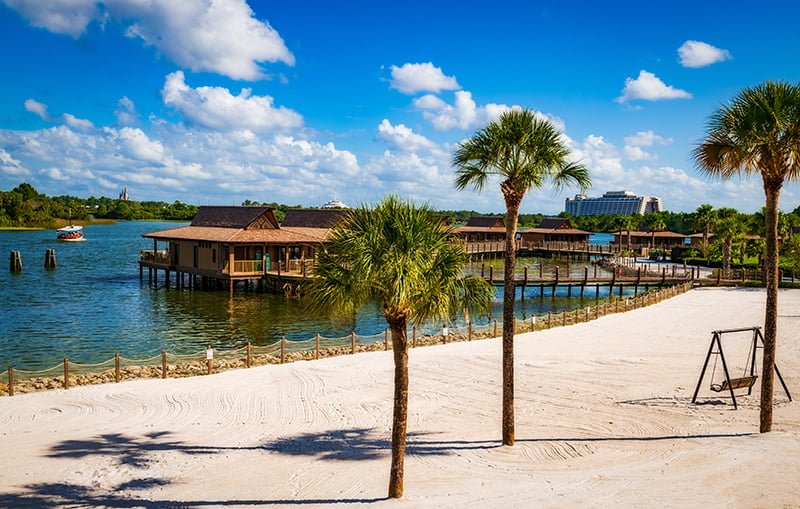

With that in mind, Walt Disney World is more expensive than Universal Orlando at every single hotel tier. For off-season dates, the gap is not particularly pronounced between Endless Summer and the All Stars, but it grows larger for more popular dates and higher end hotels. At the mid-tier, Disney prices can be double Universal’s. At the top tier, Disney often charges triple or more for comparable accommodations.
In light of the above, the case could be made that there is no such thing as “comparable” between Universal and Disney since there isn’t a single hotel at Universal with a view of Cinderella Castle or within walking distance of the most popular theme park in the world. After all, location rules real estate. That argument is less persuasive when comparing prices of Saratoga Springs or Old Key West to Hard Rock Hotel or Royal Pacific, though.
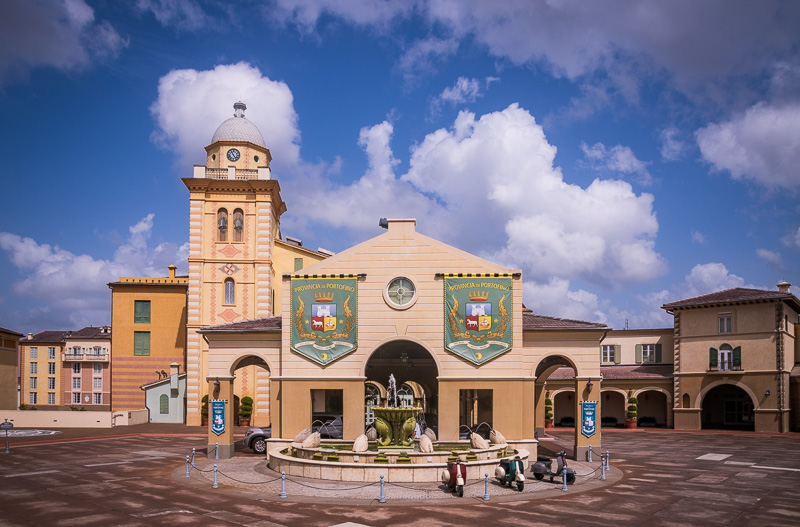

Editorializing a bit, I believe that we’re currently living through a halcyon age of Universal resort pricing. In less than a decade, Universal has built 5 new hotels and nearly tripled its number of on-site rooms. During that same span, the complex added Volcano Bay water park and theme park attendance has increased, but not to a proportional degree–or anything close to it.
In part, this expansion was likely overdue, satisfying some of the demand from the Wizarding World of Harry Potter. It’s also likely that Universal Orlando aggressively developed its hotel portfolio ahead of theme park expansion projects with the expectation that demand and bookings would soon follow suit.
Epic Universe is likely viewed as a game-changer for Universal Orlando’s status as a destination resort–three theme parks and a water park will entice many more people to stay on-site. Simply put, demand has not yet caught up to hotel development.
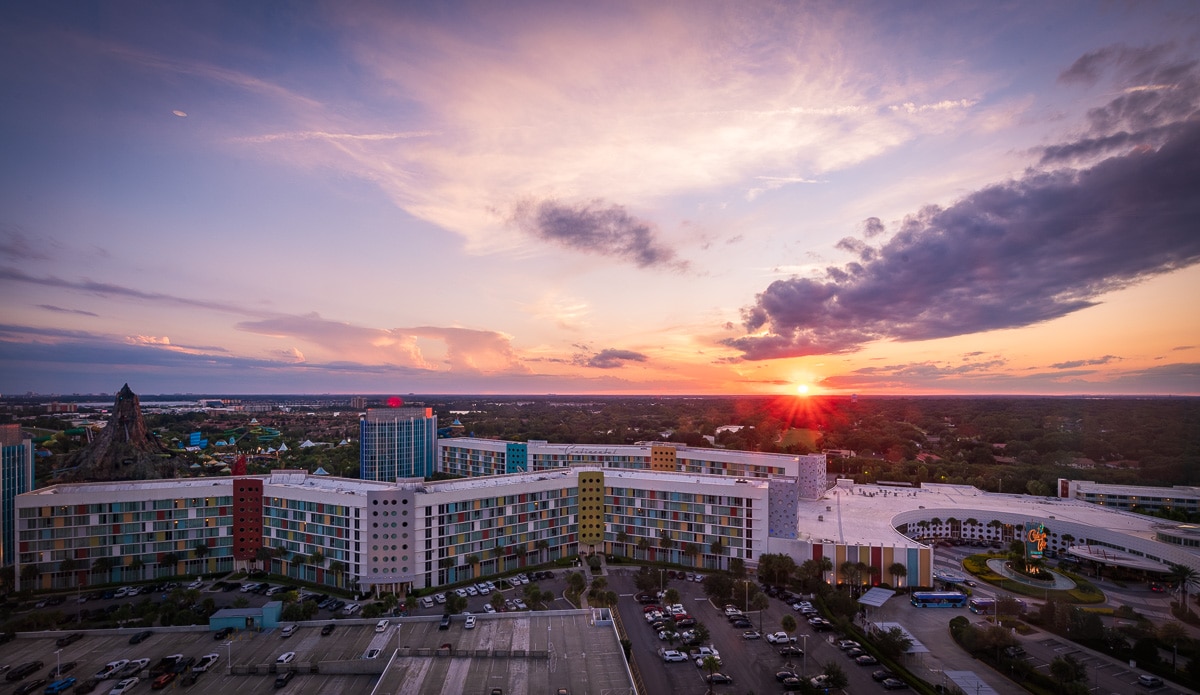

It should go without saying, but higher demand will result in higher hotel prices. It’s not as if Universal is purposefully charging below-market rates because the company wants to be more fair to theme park fans, or its leaders have been benevolently inspired by Walt Disney’s “dream” to offer affordable accommodations to the middle class. These are both ruthless multinational corporations; businesses don’t get into the Fortune 50 these days by being charitable towards consumers.
If Universal could charge Polynesian prices for Royal Pacific right now, they would. But they cannot (at least, not yet), so they do not. There’s likely to be a point in the not-too-distant future when Universal Orlando’s theme park lineup has considerably more drawing power, and its resort prices will increase as a result.
Personally, I wouldn’t be surprised if Universal’s top tier hotels average double their current costs in about 5 years, following a similar trajectory to what has happened with Disney resorts. If you’re looking for strong value, now is definitely the time to book Universal hotels–they’re arguably underpriced for their quality, location, and perks.
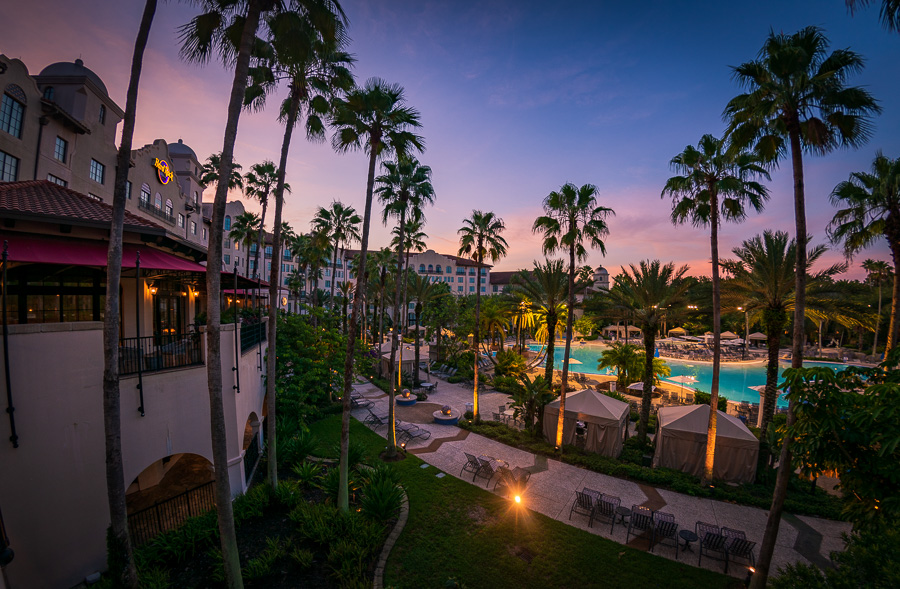

April 2024 Update: This editorial was originally written two years ago, and has already been at least partially vindicated. In pricing out stays at Universal over the last year, we’re seeing effective increases (after discounts) of about 30% or so on average. Although Walt Disney World has also increased rack rates during this time (by about 4%), they have also resumed offering better discounts. That was not the case at this same time last year, meaning that Walt Disney World’s effective room rates have decreased while Universal’s have increased.
If you’re a Walt Disney World diehard thinking this is some form of vindication: don’t. The gap is still quite wide, and Universal is significantly cheaper on average. However, the ‘price chasm’ is closing. As Universal becomes more popular and pulls hotel guests away from Walt Disney World with the opening of Epic Universe, expect this trend to continue.
What we’ve seen in the last year is only a small sneak peek of the future, and it’s still your best bet to stay at Universal hotels now rather than waiting for 2025 to roll around…unless you want to pay considerably higher prices!
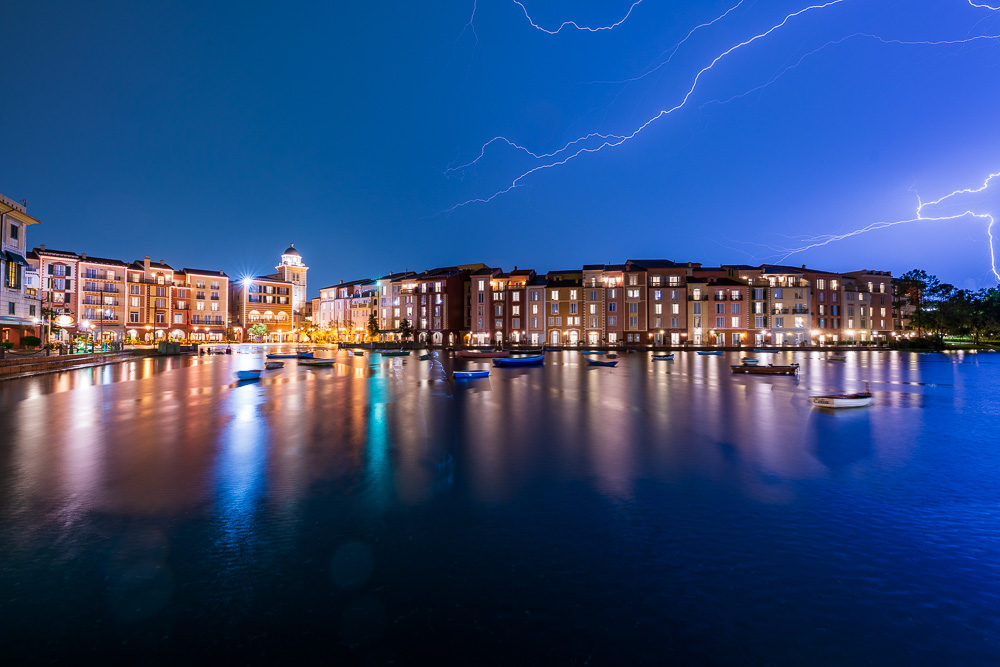

Ultimately, our opinion is that Universal Orlando has made tremendous strides in the last several years, and is now beating Walt Disney World in the hot Orlando hotel market. When it comes to the pros & cons of their respective hotels, and especially with regard to value, Universal resorts are more compelling.
If you’ll be spending equal (or close to it) time at Universal and Walt Disney World during your Orlando, Florida vacation, you should give serious thought to staying at Universal instead of Disney–or at least doing a split stay. It should go without saying, but if you’re not visiting Universal Studios Florida or Islands of Adventure, you shouldn’t consider Universal’s hotels.
Arguably, we are “burdened” by past experience with the superior hotel product that Disney used to offer (and at lower prices), so it’s possible that our perspective here is colored by that. The case also could be made that Walt Disney World is simply charging what the market will bear, and the market bears a lot higher prices because the underlying product is better or in higher demand. That could be true, but it also could be true that the reputation of Disney’s superior hotel product was built in the past, and is now coasting on its laurels to some degree. Perhaps all of that is true to varying degrees.
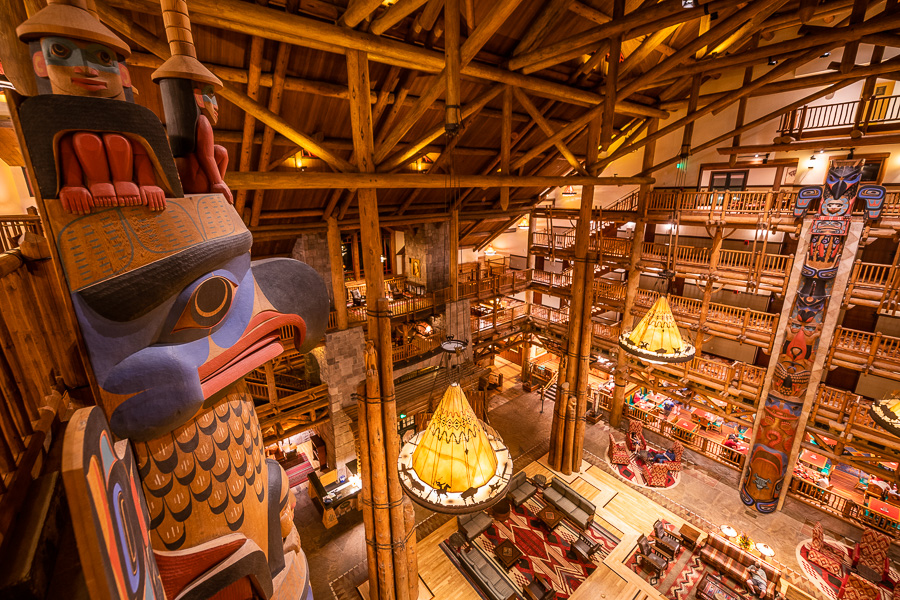

There’s a lot to consider when determining whether you want to stay at Walt Disney World or Universal Orlando–or both. There’s no one size fits all answer as to which is “better.” Different families might make very different decisions based upon what matters most to them–there’s really no objectively right or wrong answer, it’s more what you want out of your vacation and how you weigh the pros and cons.
The subjective factors are almost always going to be the overriding ones, which makes this comparison really challenging. One advantage that makes Universal or Disney a no-brainer slam dunk for one family might be totally irrelevant for another. Which is right for you is largely a matter of preference and vacation priorities, but hopefully this post presented some considerations for you to weigh and make the decision for yourself. At the end of the day, competition between the two benefits consumers, so even if Universal is a “hard no” for you, it’s great to see them so aggressively expanding in Central Florida.
Need trip planning tips and comprehensive advice for your visit to Central Florida? Make sure to read our Universal Orlando Planning Guide for everything about Islands of Adventure and Universal Studios Florida. Also check out our Walt Disney World Vacation Planning Guide for everything about those parks, resorts, restaurants, and so much more. For regular updates, news & rumors, a heads up when discounts are released, and much more, sign up for our FREE email newsletter!
Your Thoughts
Do you generally stay at Universal Orlando or Walt Disney World? What are your key considerations when determining where you stay? If you’ve previously been loyal to WDW, are you considering Universal (or other off-site) hotels for your next Florida vacation? Do any of the selling points above tip the scales in favor of one or the other? Anything we’ve overlooked or done insufficient justice? Do you agree or disagree with our advice? Any questions we can help you answer? Hearing your feedback–even when you disagree with us–is both interesting to us and helpful to other readers, so please share your thoughts below in the comments!

